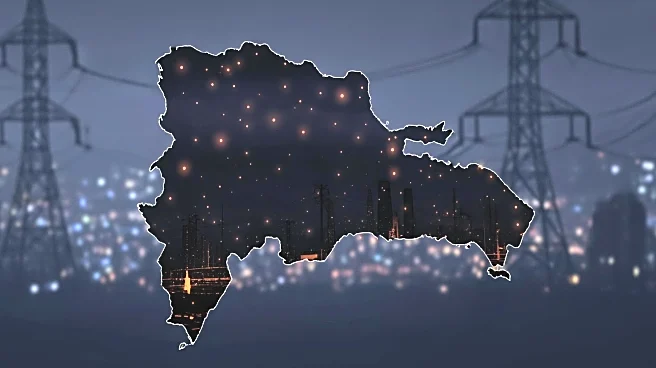What's Happening?
The Dominican Republic experienced a rare and extensive blackout on Tuesday, affecting the entire nation of nearly 11 million people. The blackout was attributed to a failure in the grid's transmission system, although the exact cause remains unclear.
The shutdown of generation units in San Pedro de Macorís and the Quisqueya Power Plant led to a cascade of failures across other transmission and generation plants. As of Tuesday night, only 15% of the system had been restored, according to Energy Minister Joel Santos. The blackout disrupted mass transit systems, including aerial cable cars and the metro in Santo Domingo, forcing some commuters to walk through tunnels alongside the railway. Hospitals, banks, and other large institutions relied on generators, while many homes and small businesses were left without power.
Why It's Important?
The blackout in the Dominican Republic highlights the vulnerability of the nation's energy infrastructure and the potential for widespread disruption in daily life. With transportation and health sectors prioritized for power restoration, the outage underscores the critical need for reliable energy systems. The incident may prompt a reevaluation of the country's energy policies and infrastructure investments, particularly given its reliance on oil, coal, and natural gas. The blackout's impact on businesses and public services could have economic repercussions, affecting productivity and daily operations. The situation also raises concerns about the resilience of energy systems in other regions with similar dependencies.
What's Next?
Authorities are investigating the cause of the blackout, with Energy Minister Joel Santos emphasizing the complexity of the electrical system and the need for in-depth analysis before issuing a final report. The restoration of power is expected to be gradual, with transportation and health sectors receiving priority. The incident may lead to discussions on improving the country's energy infrastructure and exploring alternative energy sources to prevent future occurrences. Stakeholders, including government officials and energy companies, are likely to engage in dialogue to address the vulnerabilities exposed by the blackout.
Beyond the Headlines
The blackout in the Dominican Republic may prompt broader discussions on energy security and sustainability in the Caribbean region. The reliance on fossil fuels for energy generation highlights the need for diversification and investment in renewable energy sources. The incident could serve as a catalyst for policy changes aimed at enhancing energy resilience and reducing dependency on non-renewable resources. Additionally, the blackout may influence public perception and demand for more reliable and sustainable energy solutions.

















